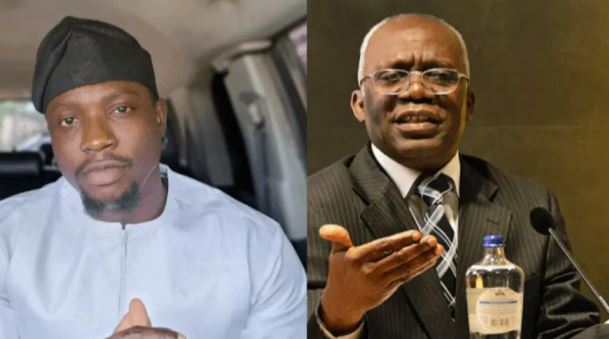A court has issued a far-reaching order against controversial online critic Vincent Martins Otse, popularly known as VeryDarkMan (VDM). The ruling, which comes as a climax to a highly publicized legal battle with renowned human rights lawyer Femi Falana and his son, rapper Folarin ‘Falz’ Falana, has significant implications for freedom of speech, social media conduct, and the power of legal action in the digital age.
On October 15, 2024, a legal notice circulated on social media platforms, revealing the court’s decision in the case against VeryDarkMan. The ruling is nothing short of a comprehensive victory for the Falanas, with the court ordering VDM to:
- Pay a staggering ₦500 million in damages to Femi Falana
- Delete all videos and posts related to Femi Falana
- Cease and desist from any future posts or mentions of the human rights lawyer
This verdict marks a significant moment in Nigerian jurisprudence, setting a precedent for how the legal system deals with online defamation and social media conduct.
The case stems from a series of social media posts and videos in which VeryDarkMan accused the Falanas of bribery. These accusations were made in the context of VDM’s attempts to target crossdresser Idris Okuneye, known as Bobrisky. The Falanas, known for their strong stance on human rights and social justice, promptly promised legal action against VDM for what they deemed as defamatory statements.
Legal expert Oluwaseun Adebayo commented on the case: “This ruling underscores the serious legal consequences that can arise from unsubstantiated accusations made on social media. It’s a wake-up call for online personalities who might think the digital space is beyond the reach of law.
The court’s decision has sparked a heated debate about the balance between free speech and protection against defamation. While many see the ruling as a necessary check on irresponsible social media behavior, others worry about its potential to stifle legitimate criticism.
The public response to the court’s decision has been varied, reflecting the complex nature of the case and its implications. Some Nigerians have expressed satisfaction with the ruling, seeing it as justice served against what they perceive as irresponsible social media behavior.
User @___greisee commented, “Delete and have peace, message have been passed 
However, others view the ruling as excessive and potentially oppressive. @Princesstohhawt expressed this sentiment, stating, “Oppression and misused of power. SMH.”
The divide in public opinion highlights the ongoing debate about the role of social media in public discourse and the limits of free speech in the digital age.
This case brings to the forefront the evolving relationship between social media and legal systems worldwide. As online platforms continue to play an increasingly significant role in shaping public opinion and discourse, legal frameworks are struggling to keep pace.
VeryDarkMan’s rise to notoriety is itself a testament to the power of social media in modern Nigeria. Known for his controversial takes on various social issues, VDM has amassed a significant following, with his videos often going viral and sparking intense debates.
Social media analyst Tunde Ogundipe commented on VDM’s impact: “VeryDarkMan represents a new breed of social media influencers who have found a niche in controversy. His confrontational style has earned him both devoted followers and fierce critics. This court case may well be a turning point in how such influencers operate.”
On the other side of this legal battle are the Falanas, a family known for their contributions to Nigerian law, human rights, and entertainment. Femi Falana has long been a prominent figure in Nigerian legal circles, known for taking on high-profile human rights cases. His son, Folarin ‘Falz’ Falana, has carved out a successful career as a rapper and actor, often using his platform to address social issues.
Legal commentator Bola Adeosun noted: “The Falanas’ decision to pursue this case so vigorously sends a message about the seriousness with which they view their reputation. It’s also a reminder of the legal firepower that public figures can bring to bear in such disputes.”
As the dust settles on this landmark ruling, questions remain about its long-term implications. Will this case lead to more cautious behavior from social media personalities? Could it result in a flood of similar lawsuits against online critics?
Digital policy expert Aisha Buhari (no relation to the former First Lady) offered her thoughts: “This ruling could be a watershed moment for social media conduct in Nigeria. We might see a more restrained approach from online commentators, but there’s also a risk of overcorrection, where legitimate criticism is stifled out of fear of legal repercussions.”
Interestingly, the case has also reignited discussions about Bobrisky, the crossdresser who was at the center of VDM’s original accusations. Some social media users, like @Azcomgh, wondered, “Does that mean that Bob case has been pushed aside?
This question highlights the complex web of issues surrounding the case, from LGBTQ+ rights in Nigeria to the nature of celebrity in the social media age.
The court’s ruling against VeryDarkMan marks a significant moment in the ongoing negotiation between free speech, personal reputation, and legal accountability in Nigeria’s digital space. As social media continues to evolve as a platform for public discourse, this case will likely be referenced as a key precedent in future disputes.
For VeryDarkMan, the path forward is unclear. Will he comply with the court’s orders, or will he choose to challenge the ruling? For the Falanas, this victory reinforces their reputation for robust legal action in defense of their rights.
As Nigeria continues to navigate the complex intersection of law, technology, and free speech, cases like this will undoubtedly play a crucial role in shaping the country’s digital future. The message from the courts is clear: in the world of social media, words have consequences, and the law is watching.




